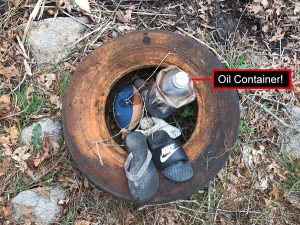Plastics that are dumped in rivers is a major source of ocean pollution.
Not to mention the havoc it raises on riverways, injuring and killing waterfowl, marine life and costing cities and towns for the cleanup.
This is a collection of garbage I picked up walking along the edge of the marsh last week on the Slocums River. Sandles, about six rubber balls, a football, styrofoam, and oh yes a tire.
As you can see in the photograph above that container is full of oil. Pretty amazing considering this was what I gathered walking about 75 feet along the marsh, can you imagine what is dumped along the entire Slocum River? To me, this is an eyeopener.
Researchers at The Ocean Cleanup—a Dutch foundation developing new technologies for ridding the oceans of plastic—say rivers carry an estimated 1.15-2.41 million tonnes of plastic into the sea every year, an amount that need between 48,000 to over 100,000 dump trucks to carry it away.
Read more at: https://phys.org/news/2017-06-plastic-rivers-major-source-ocean.html#jCp
Every year, more than eight million tons of plastic end up in the ocean, costing at least $8 billion (7.1 billion euros) in damage to marine ecosystems and killing an estimated one million seabirds, 100,000 sea mammals and untold numbers of fish.
It’s interesting to note the top 20 polluting rivers were mostly located in Asia and accounted for more than two thirds (67%) of the global annual input while covering 2.2% of the continental surface area and representing 21% of the global population. Furthermore, the top 122 polluting rivers (4% of total landmass surface area and 36% of global population) contributed for >90% of the plastic inputs with 103 rivers located in Asia, eight in Africa, eight in South and Central America, and one in Europe.
Read more at Nature Communications
How to reduce river pollution
- First, pick up any plastics that you see littering the marsh.
- If your out kayaking, tie down your sandals, and any other gear that might fall into the water.
- If you are going fishing be sure your fishing line is in tip-top condition, fishing gear is a real source of pollution that has an adverse effect on marine life.
- Be sure to make a checklist of your gear and carry on prior to going out in your watercraft. Check it on the way back to the landing or to your vehicle.
- Don’t throw anything out, bring a bag, maybe nylon, or canvas, If not and it’s plastic all the more reason to be sure to place your plastics in it and bring it back.
Keep Slocums River Clean
We all know how terrible it looks seeing a bunch of plastic bottles floating on the water or along the beach. Pollution affects all of us, especially those of us who enjoy the outdoors.
It’s important that we do our part and be responsible for our own activities while out on the water. Clean riverways don’t happen by themselves, we have to be resolute and do our part to keep things contained.
I believe everyone should have access to our local waterways, but at the same time, I think we all need to share in the responsibilities to keep things clean.
